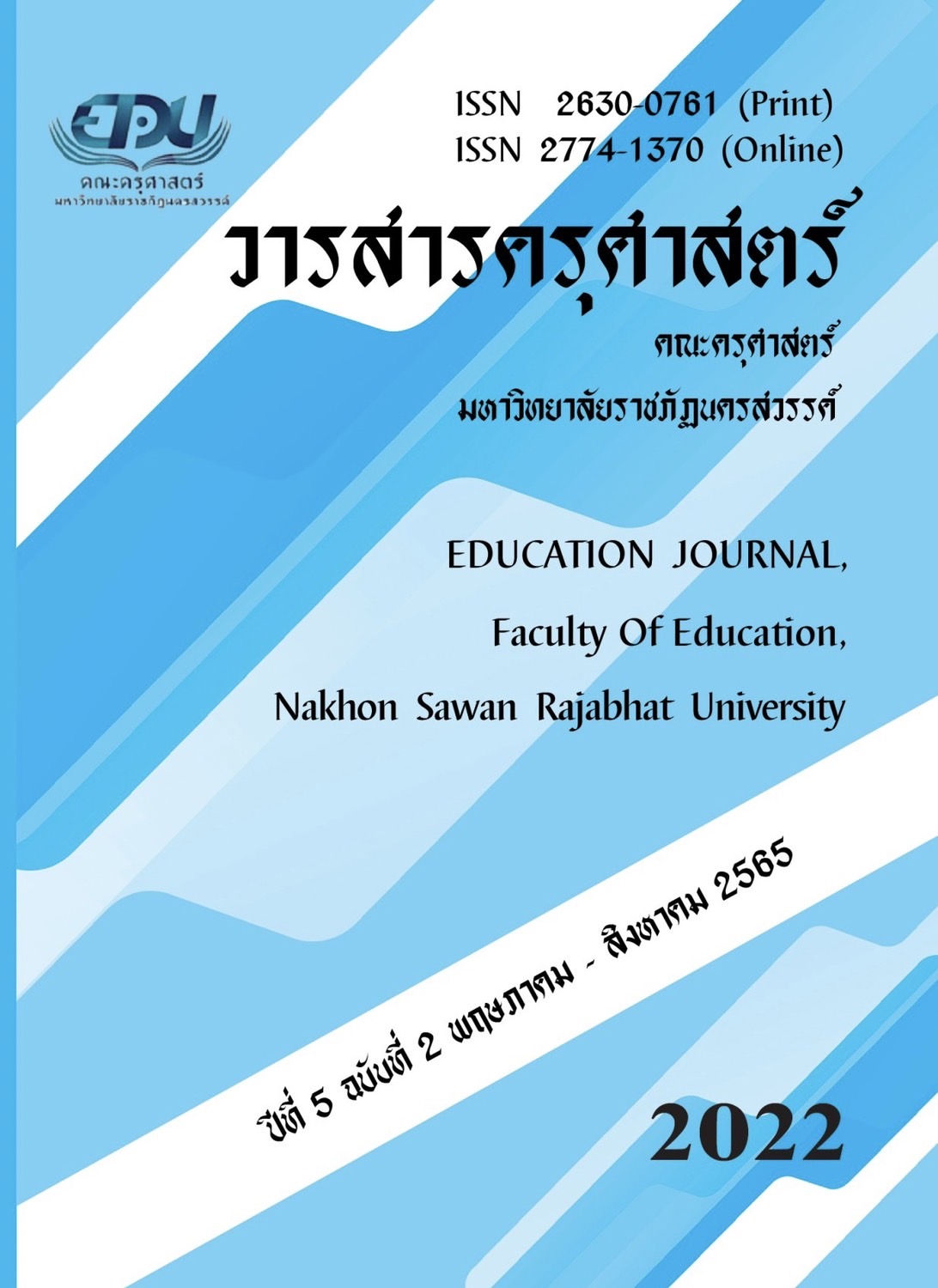Services Quality Components Affected Behavioral Intentions of Personnels in Somsanook Nadong School Group under Buengkan Primary Educational Service Area Office
Main Article Content
Abstract
The purpose of this research were 1) to study the services quality components in Somsanook Nadong School Group under BuengKan Primary Educational Service Area Office 2) to study the behavioral intentions of personnels in Somsanook Nadong School Group and 3) to study the relationship of the services quality components affected the behavioral intentions of personnels in Somsanook Nadong School Group. The sample were 286 personnels in Somsanook Nadong School Group under BuengKan Primary Educational Service Area Office consisted of 286 people using a simple random sampling method. The research tools were the service quality component questionnaire that affects the personnel's behavioral intentions. Data were analyzed by percentage, mean and standard deviation. The results of the research were found that;
1) the services quality components in Somsanook Nadong School Group under BuengKan Primary Educational Service Area Office. In overall and each aspect were at the highest level, 2) the behavioral intentions of personnels in Somsanook Nadong School Group under BuengKan Primary Educational Service Area Office, in overall and each aspect were at the highest level and 3) the relationship of the services quality components affected the behavioral intentions of personnels in Somsanook Nadong School Group under BuengKan Primary Educational Service Area Offices were as follows: the efficiency of personnel interactions had a significant positive affected on the quality of service at the .05 level. The operating environment had a positive affected on service quality at .01 level. Service quality had a significant positive affected on the behavioral intentions, loyalty and bonds at .05 level.
Downloads
Article Details

This work is licensed under a Creative Commons Attribution-NonCommercial-NoDerivatives 4.0 International License.
References
กัญจนวลัย นนทแก้ว แฟร์รี่. (2562). การสร้างความผูกพันต่อองค์การของเจนเนอเรชั่นซี. วารสารวิชาการมหาวิทยาลัยฟาร์อีสเทอร์น, 13(3), 10 – 22.
จันทรฉวี ดีเสมอ. (2561).ปัจจัยที่มีอิทธิพลต่อการตัดสินใจรับบริการสถานพยาบาลสัตว์เอกชน: จังหวัดสุพรรณบุรี. วารสารวิชาการมหาวิทยาลัยฟาร์อีสเทอร์น, 12(4), 18 – 30.
ฐณัฐ วงศ์สายเชื้อ. (2563). วิเคราะห์สหสัมพันธ์. สืบค้นเมื่อ 20 พฤศจิกายน 2563, จาก https://nutdnuy.medium.com/ การวิเคราะห์สหสัมพันธ์-6b2a080c92e1.
ธงชัย สันติวงษ์. (2560). พฤติกรรมองค์การ. กรุงเทพฯ: ไทยวัฒนาพานิช.
บุญชม ศรีสะอาด. (2553). การวิจัยเบื้องต้น. (พิมพ์ครั้งที่ 10). กรุงเทพฯ: สุวิริยาสาส์น.
วิโรจน์ สารรัตนะ. (2560). กระบวนทัศน์ใหม่ทางการศึกษาในต้น ศตวรรษที 21. กรุงเทพฯ: ทิพย์วิสุทธิ์.
ศิริรัตน์ รัตนพิทักษ์. (2561). ปัจจัยคุณภาพการบริการที่ส่งผลต่อเจตนาพฤติกรรม กรณีศึกษาสมาคมไทยธุรกิจการท่องเที่ยว. วารสารวิชาการมหาวิทยาลัยหอการค้า, 38(4), 108 – 126.
สุนทร สมลือแสน. (2559). การสื่อสารองค์การในโรงเรียนขนาดเล็ก สังกัดสำนักงานเขตพื้นที่การศึกษาขอนแก่นเขต 4.วิทยานิพนธ์ครุศาสตรมหาบัณฑิต (พุทธการบริหารการศึกษา). มหาวิทยาลัยมหามกุฏราชวิทยาลัย.
อาศยา โชติพานิช. (2549). การบริการที่ดี. กรุงเทพฯ: โอเดียนสโตร์.
Booms, & Mohr, L. A. (2002). Critical Services Encounters: Employees’ viewpoint. The Journal of Marketing, 66(4), 95 - 107.
Brady, M. K. (2001). Conceptualizing Perceived Services Quality: Hierrarchical Approach. The Journal of Marketing, 65(3), 34 - 49.
Krejcie, R. V., & Morgan, D. W. (1977). Determining Sample Size for Research Activity. Educational and Psychological Measurement, 30(3), 607 - 610.
Park, C. W. (2010). Beyond Attitude: Attachment and Consumer Behavior. Seoul Nationnal Journal, 12(2), 23 - 36.
Parasuraman, Zeithaml, V. A., A. (1996). The Behavioral Consequences of Service Quality. The Journal of Marketing, 60(2), 31 - 46.


